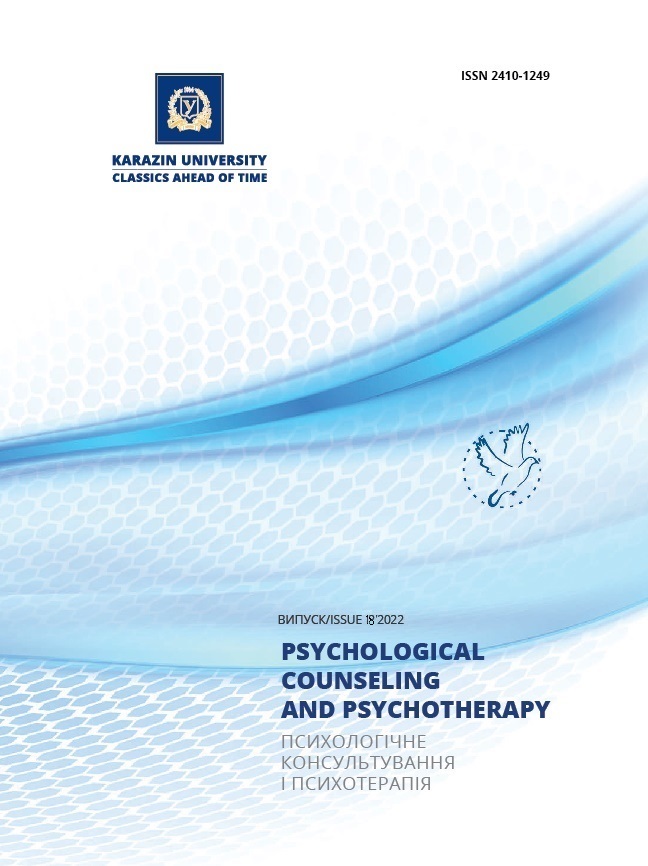Поствоєнна Україна: психологічні та психотерапевтичні персективи
Анотація
Стаття має на меті описати ситуацію в Україні з психологічної та психотерапевтичної точки зору. Ситуації перед війною пояснюються та порівнюються з тими, які потрібно взяти у післявоєнний період, щоб зміцнити психологію та психотерапію в Україні. Також обговорюються можливі політичні та адміністративні обставини. Надаються кроки, які можна зробити, щоб покращити ситуацію для психологів в Україні. Збільшення фінансування: однією з найбільших проблем, з якою стикаються психологи в Україні, є брак ресурсів і фінансування. Збільшення фінансування служб психічного здоров’я та навчальних програм могло б допомогти покращити якість допомоги, яку психологи можуть надавати своїм пацієнтам. Необхідне визнання психічного здоров'я та ролі психологів у наданні допомоги може допомогти зменшити стигму та розширити співпрацю між психологами та іншими медичними працівниками. Необхідна більша кількість ресурсів і навчальних матеріалів українською мовою для покращення доступу до інформації та ресурсів для українських психологів, а також підтримати розвиток сильної, орієнтованої на місцевість дослідницької бази. Створення більшої кількості робочих місць для психологів, особливо в недостатньо забезпечених регіонах, може допомогти розширити доступ до послуг психічного здоров'я для тих, хто їх потребує. Безперервна освіта: психологів. Освіта та обізнаність громадськості можуть допомогти заохотити більше людей звертатися за необхідною допомогою до психологів та інших спеціалістів у сфері психічного здоров’я. .Звичайно, ці кроки є лише відправною точкою, і вирішення складних проблем, які постають перед психологами в Україні.
Завантаження
Посилання
Bereziuk, S., Pronko, L., & Samborska, O. (2020). The Phenomenon of Political Power in Ukraine. European Journal of Sustainable Development, 9(2), 488. https://doi.org/10.14207/ejsd.2020.v9n2p488
Horton R. (2022). Offline: Ukraine-difficult lessons for global health. Lancet. 9, 399 (10333) 1370. https://doi.org/10.1016/S0140-6736(22)00653-5. PMID: 35397855.
Panok, V., Pavlenko, V., Korallo, L., (2006). Psychology in the Ukraine. Psychologist-Leicester. 19.12 730.
Pavlenko, V. (2003). The Influence of some Topics from School Textbooks on Ethnic Stereotype Formation. In Crossing borders, changing minds, J.S. Fure & L.A. Ytrehus (Eds.) (pp. 55–57). Oslo: Høyskoleforlaget-Norwegian Academic Press.
Pavlenko, V., Kryazh, I., Ivanova, O. & Barrett, M. (2001). Age characteristics of social identifications and ethno-national beliefs in Ukraine. In Development of national, ethnolinguistic and religious identities in children and adolescents. M. Barrett, T. Ryazanova & M. Volovikova (Eds.) (pp.105–132). Moscow: Institute of Psychology, Russian Academy of Science.
Stevenson, A., Cultural issues in psychology: A student's handbook. Routledge, 2009.
Shevlin, M., Hyland, P., Karatzias, T., Makhashvili, N., Javakhishvili, J., Roberts, B. (2022). The Ukraine crisis: Mental health resources for clinicians and researchers. J. Trauma Stress. 35(3), 775-777. https://doi.org/10.1002/jts.22837. PMID: 35366367;
Fontanarosa, P.B., Flanagin, A., Golub, R.M. (2022). Catastrophic Health Consequences of the War in Ukraine. JAMA. 327(16), 1549-1550. https://doi.org/10.1001/jama.2022.6046. PMID: 35363251.
Burlaka, V., et al. (2014). Perceived barriers to mental health services: A mixed-method study with Ukrainian college students. European Journal of Higher Education, 4(2), 167 183.
Panok, V., (2016). Theoretical justification of applied psychology. Psychology and society, 1(63), 91-108. (in Ukrainian)
Shoib, S., Zharkova, A., Pal, A., Jain, N., Saleem, S.M., Kolesnyk, P. (2022). Refugees and Mental health crisis in Ukraine. Asian J. Psychiatr. 74, 103169. https://doi.org/10.1016/j.ajp.2022.103169. PMID: 35691058.
Edirippulige, S., Levandovskaya, M., Prishutova, A., (2013). A qualitative study of the use of Skype for psychotherapy consultations in the Ukraine. J. Telemed. Telecare. 19(7), 376-378. https://doi.org/10.1177/1357633X13506523. PMID: 24218348.
Bogdanov, S., Augustinavicius, J., Bass, J.K., Metz, K., Skavenski, S., Singh, N.S., Moore, Q., Haroz, E.E., Kane, J., Doty, B., Murray, L., Bolton, P. (2021). A randomized-controlled trial of community-based transdiagnostic psychotherapy for veterans and internally displaced persons in Ukraine. Glob. Ment. Health. (Camb). 8, e32. https://doi.org/10.1017/gmh.2021.27. PMID: 34513001; PMCID: PMC8392687.
Kechur, R., Yaskevych, O., Turezka, K., (2021). Psychoanalytic style and its relation to literature. Psychological Journal, 7(5), 85-96. (in Ukrainian)
Kechur, R., Yaskevych, O., Turezka, K., (2020). Aesthetic personality orientation and its connection with empathy. Psychological Journal, 6(5). 239-248. (in Ukrainian)
Birkle, S.M., Vallejo-Valdivielso, M., Martsenkovskyi, D., Yilmaz, H., Sebela, A., Ghosh, S., Awhangansi, S., Kodra, V., Mirković, A. (2019). Early Career Perspectives. Z Kinder Jugendpsychiatr Psychother. 47(1), 90-92. https://doi.org/10.1024/1422-4917/a000643. PMID: 30628863.
Frankova. I., Vermetten, E., Shalev, A.Y., Sijbrandij, M., Holmes, E.A., Ursano, R., Schmidt, U., Zohar, J. (2022). Digital psychological first aid for Ukraine. Lancet Psychiatry. 9(7), e33. https://doi.org/10.1016/S2215-0366(22)00147-X. PMID: 35526557.
Ahmad, J., Okwuowulu, C., Sanusi, B., Bello, S.A., Talabi, F.O., Udengwu, N., Gever, V.C. (2022). Impact of social media-based dance therapy in treating depression symptoms among victims of Russia-Ukraine war. Health Promot. Int. 37(6), 172. https://doi.org/10.1093/heapro/daac172. PMID: 36508393.
Fedko, S.L., Kurbatova, A., Remesnyk, N., Matviienko, I., Parasiei-Hocher, A., Kryvda, N., Elzahraa, H.F. (2021). Cultural Awareness in Contemporary Mental Health Practice. Wiad Lek., 74(11), 2762-2767. PMID: 35023489.
Goto, R., et al. (2023). Mental health services in Ukraine during the early phases of the 2022 Russian invasion. The British Journal of Psychiatry, 222(2). 82-87.
Oviedo, L., Seryczyńska, B., Torralba, J., Roszak, P., Del Angel, J., Vyshynska, O., Muzychuk, I., Churpita, S. (2022). Coping and Resilience Strategies among Ukraine War Refugees. Int. J. Environ. Res. Public. Health. 19(20), 13094. https://doi.org/10.3390/ijerph192013094. PMID: 36293686; PMCID: PMC9602814.
Singh, N.S., et al. (2021). Experiences of mental health and functioning among conflict-affected populations: A qualitative study with military veterans and displaced persons in Ukraine. American Journal of Orthopsychiatry, 91(4), 499.
Іmas, Y., Lazarieva, O., (2017). Pre-conditions and modern development of specialities in physical therapy and ergo-therapy in Ukraine. Physical education, sport and health culture in modern society, 2(38), 10-15.
Della, S.S., Grafman, J. (2022). Invasion of Ukraine: It can't be business as usual in science. Cortex. 150, 165-166. https://doi.org/10.1016/j.cortex.2022.04.002. PMID: 35422320.
Barnes, M.E., Greer, S. (2016). The history specialist in psychology: From avocation to professionalization. Hist. Psychol. 19(3), 192-208. https://doi.org/10.1037/hop0000027. PMID: 27442030.
Calam, R., El-Khani, A., Maalouf, W. (2022). Editorial Perspective: How can we help the children of Ukraine and others affected by military conflict? Child. Adolesc. Ment. Health. 27(3), 294-296. https://doi.org/10.1111/camh.12581. PMID: 35892181.
Baraka, M.K., et al. (2021). Cross-Cultural Counselling Supervision in Ukraine. International Journal for the Advancement of Counselling, 43, 320-339








